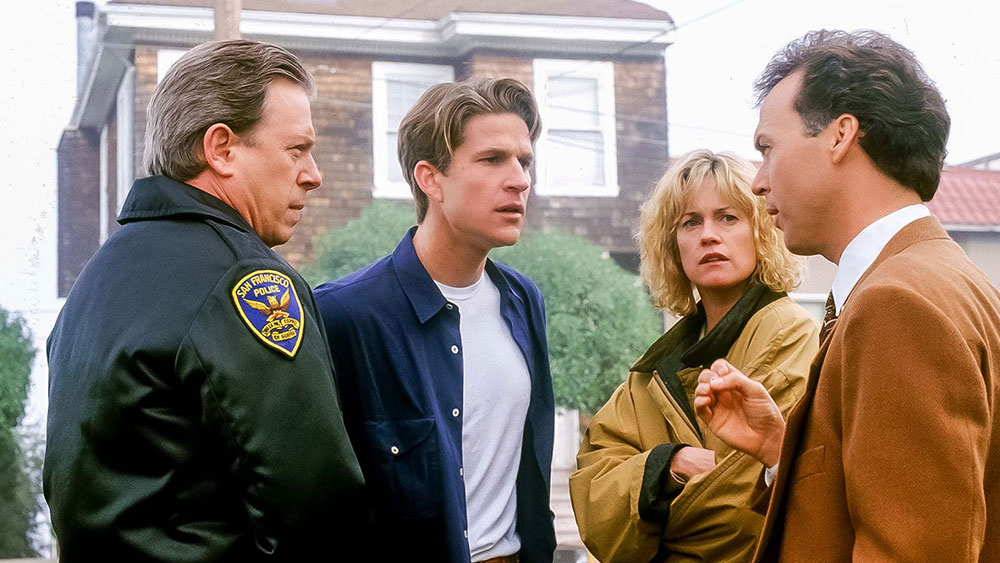An excerpt from an essay in the Kill Yr Landlords zine about John Schlesinger's Pacific Heights, in which first-time homeowners rent their second unit to a psychotic tenant who exploits eviction laws to terrorize the couple.
Director John Schlesinger was politically ambiguous. In her 2019 monograph on Schlesinger, the film and literary historian Julia Prewitt Brown wrote that compared to his contemporaries—such as Lindsay Anderson and Tony Richardson—he was less “ideologically committed to the left” and, quoting Raymond Williams, “more of a ‘dissident bourgeois artist.’” More than any kind of coherent political position, what comes through in Pacific Heights is what Newsweek’s erstwhile culture correspondent Paul Bond called Schlesinger’s “confused political hankering for ‘fairness.’” “I just want him out,” Drake whines. “No harm, no foul.” When Drake cuts the power and gas to Carter’s unit, the cops show up and lecture Drake on tenant harassment: “If he’s in, he’s got rights. That’s how it works. … If he decides to fight an eviction, you’re already knee-deep in shit.” Matthew Modine’s frustration is coded as common sense and the filmic apparatus squarely aligns us with his perspective.
Viewers can be forgiven for thinking the narrative sprang from the mind of a 1980s Reagan conservative; both Schlesinger’s and screenwriter Daniel Pyne’s filmographies do suggest that there is at least a shared affinity for tales of extrajudicial punishment. In Schlesinger’s Eye for an Eye (1996), Sally Field takes it upon herself to track down her daughter’s killer, whom an effete court system has failed to prosecute, while in 2002’s Changing Lanes (which featured uncredited rewrites by Pyne), a young hotshot lawyer (Ben Affleck) and a financially precarious divorcé (Samuel L. Jackson) become obsessed with sabotaging each other’s lives after a fender bender on the FDR Drive.
Schlesinger seems more interested in moral absolutes than Pyle does, Laurence Olivier’s Doctor Szell in Marathon Man (1976) being the paradigmatic example. This is what cements Pacific Heights as a fundamentally conservative horror movie; if Michael Keaton’s character weren’t so gleefully coded as a psycho—he watches static on TV while coldly catching cockroaches with his bare hands—or had any redeeming or relatable traits whatsoever, the viewer would not feel as strong-armed into siding with the film’s landlord protagonists. (Drake and Patty ask their lawyer why on earth Carter would do something like this; she replies, “Because he’s evil?”) Pyne’s screenplay also flips the typical class relations between homeowners and tenants. Drake and Patty are an aspiring middle-class couple who have to “fudge the numbers” to qualify for a mortgage on their fixer-upper Victorian townhouse (the actual house that served as a filming location was built in 1895, not in 1886 as the broker in the film’s opening scene claims, and is not actually located in Pacific Heights, but in the far less tony Potrero Hill), while Carter is the black sheep scion of a blue-blooded Texan family. The only thing that can be said in Carter’s defense is that he’s extremely good at what he does: manipulating and scamming unsuspecting property owners. (“He’s far and away the most intelligent man I’ve ever met,” Carter’s one-time girlfriend tells Patty.) This gestures toward another micro-genre that Pyne has dabbled in, namely competence porn, of which the Amazon Prime series Bosch (2014–2021)—executive produced by Pyne—is a standard-bearer, according to the New York Times’ Joseph Bernstein.
The film’s central homeowner–renter feud is what has turned Pacific Heights into a byword for the travails of being a landlord in woke San Francisco Bay—Ted Gullicksen, director of the San Francisco Tenants Union, told SFGate in 2012, "Landlords tend to believe that Pacific Heights was a documentary as opposed to a piece of fiction”—but the film touches on several other housing issues as well: discrimination (Drake dismisses a Black applicant as “one of those minority scam artists”), predatory home equity lending (Dan Hedaya turns in a scene-stealing performance as a skeevy storefront mortgage broker), and inherited wealth (it’s implied that Michael Keaton’s character launched his criminal career after he was disinherited from his family fortune in a bitter legal battle).
The sociologist Isabel Cristina Pinedo writes, “In horror, the narrative is propelled by violence, not only the monster’s violence, but the protagonist’s. To be efficacious, the protagonist must objectify the monster and subject it to a controlling gaze; that is, she must treat the monster the way it treats her.” This is precisely how Patty is able to wreak vengeance on Carter and ultimately eliminate him from the narrative. Part of Carter’s seductive competence in destroying the couple’s investment is his ability to guide and orchestrate the aggregate violence that pulses through the film. He goads Drake into one assault by presenting him with a scale model of their house after Patty’s miscarriage and stages another with a carefully placed crowbar. Because legal and financial institutions have failed her, Patty must become like Carter, taking on a transgressive investigative gaze by breaking into his hotel room, stealing his identity, and freezing his bank account. Conveniently, Carter is led into accidentally killing himself, relieving Patty and Drake of the messier side of horror vengeance. That kind of active violence is reserved for the model house, which Patty theatrically tosses out of an upper floor window after returning home to find that Carter has placed it on her bed. But with Carter impaled on the floor of his former apartment, the film can resolve itself in the way that conservative horror almost always does: by neatly re-establishing the prevailing order of things. Our couple safely passes on their real estate investment to a younger urban professional couple, to their significant profit ($150,000, to be exact).
This afternoon is the final 35mm screening of Pacific Heights. It repeats October 9 on DCP.
The Kill Yr Landlords zine is available for pre-order.



